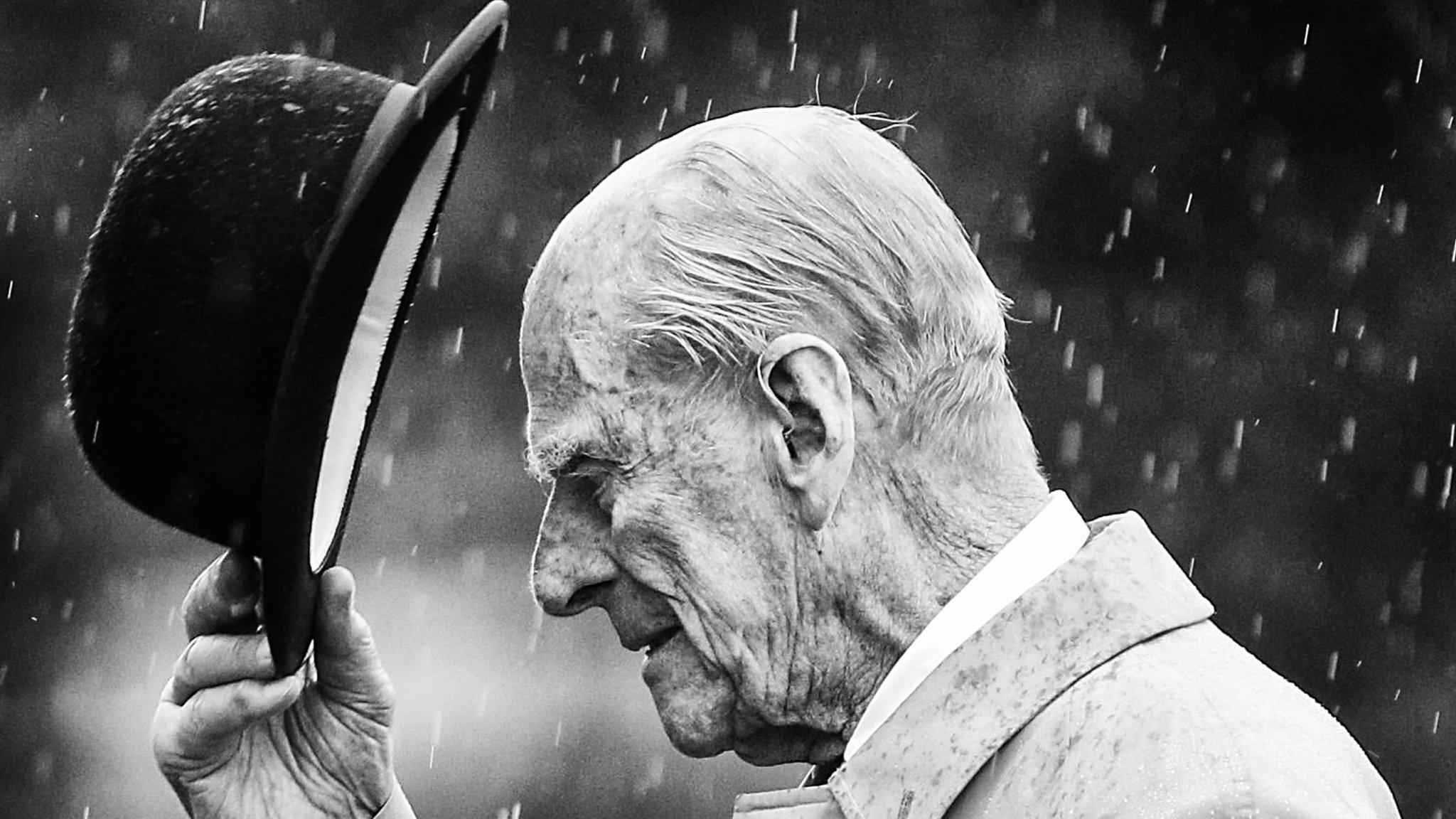The Queen and Prince Philip: An enduring royal romance
- Published
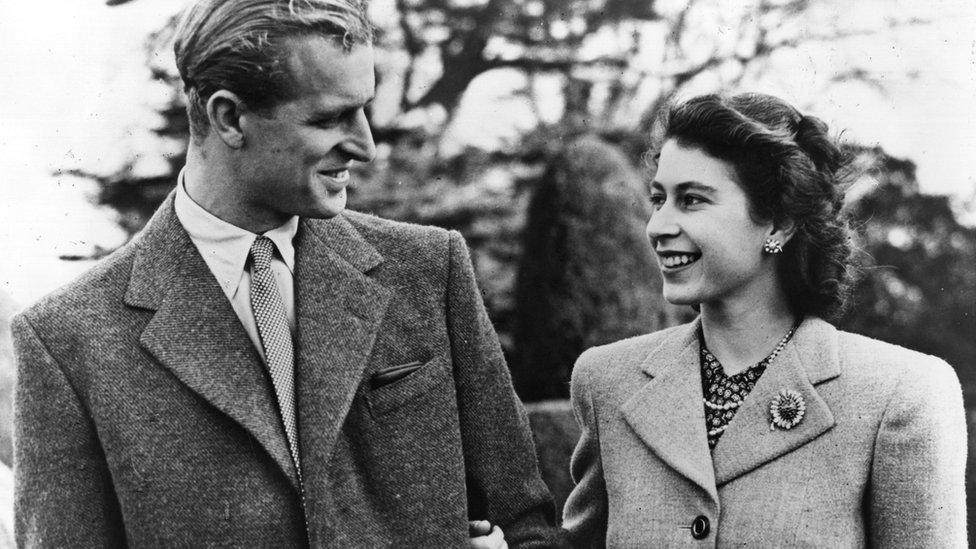
In a marriage that lasted more than seven decades, Prince Philip was the Queen's support in public at significant national moments - and in private the person who knew her best.
As one private secretary once put it: "Prince Philip is the only man in the world who treats the Queen simply as another human being. He's the only man who can."
It was a marriage based on love. They chose one another.
Although it wasn't the first time their paths had crossed, the photographs from their meeting at Dartmouth Naval College in 1939 reveal the beginning of their life together.
He was the dashing 18-year-old cadet who caught 13-year-old Princess Elizabeth's eye, larking about playing croquet and tennis.
What started as a teenage crush developed over the years into friendship with letters exchanged and occasional visits during the war years. While he was away serving with the Royal Navy, the young princess kept a picture of him in her room.
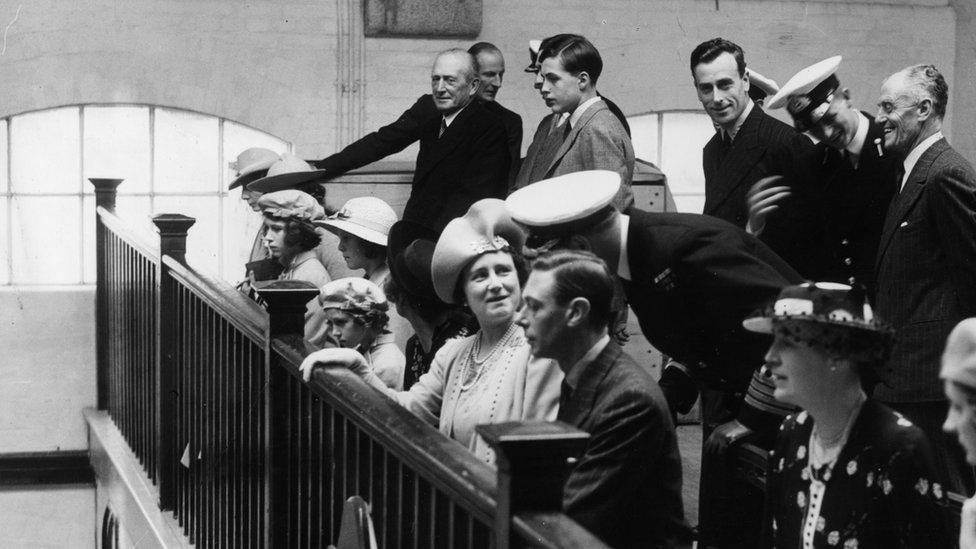
Princess Elizabeth (third from left) was photographed with her parents at the chapel at the Royal Naval College, Dartmouth in July 1939 along with naval cadet Prince Philip of Greece and Denmark (standing second from right)
His childhood had been nomadic - born a prince of Greece but then exiled, he found himself bounced around Europe, the royal equivalent of sofa-surfing.
He had to be fiercely independent, a self-starter and emotionally strong. She had grown up largely behind palace walls, sheltered from the real world. Her character was reserved, shy and thoughtful. They complemented each other.
Their grandson Prince William would later sum up their connection, saying: "He makes her laugh because some of the things he says and does and the way he looks at life is obviously slightly different than her, so together they're a great couple."
'Completely in love'
Although he had made his intentions known a year earlier, it wasn't until 1947, after Elizabeth's 21st birthday, that the public announcement of their engagement was made.
Prince Philip helped to design the platinum and diamond engagement ring using stones from a tiara belonging to his mother, Princess Alice of Greece.
Shortly before their wedding, Prince Philip wrote to the Queen Mother saying he had "fallen in love completely and unreservedly".
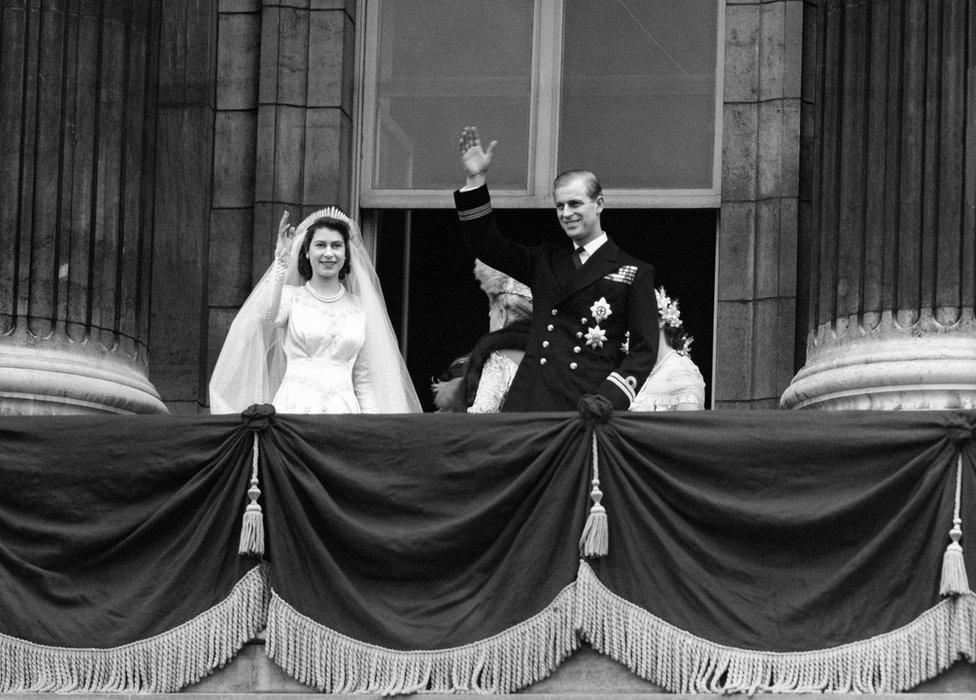
The royal couple at Buckingham Palace after their wedding
The couple were married in front of 2,000 guests in Westminster Abbey. Just two years after the end of World War Two and with the country still reeling from the conflict, their wedding was a rare moment of celebration, Winston Churchill calling it "a flash of colour on the hard road we travel".
The following year, their eldest son Charles was born, and then their daughter Anne. Prince Philip was progressing rapidly through the ranks of the navy and the young family spent time living in Malta while he served on HMS Chequers.
They were able to live a relatively normal life and film footage from the time shows a young couple, relaxed in each other's company, enjoying life in a warm climate away from palaces and duty.
All that was to change on 6 February 1952, with the premature death of King George VI. Queen Elizabeth was just 25 years old and Prince Philip aged 30. They always knew the princess was destined to become Queen but had expected a few more years to live their own lives.
For the duke, her accession meant giving up any ambitions he might have had within the Royal Navy. For a man used to commanding ships, to suddenly be relegated to a supporting role cannot have been easy.
And let's not forget this was the 1950s when it was extremely rare for a husband to be outranked by his wife. For the Queen, also a young mother, the role she was born to fulfil had to come first.
'A double act'
If their relationship suffered due to the shifting of their positions, it did so behind closed doors.
Prince Philip took some time to define his role as his wife's consort - often battling courtiers in the process.
In 1956, he spent four months travelling around distant Commonwealth nations which led some to question his commitment to his wife. But once the pair had settled into a rhythm, the pattern was set for the decades to come.
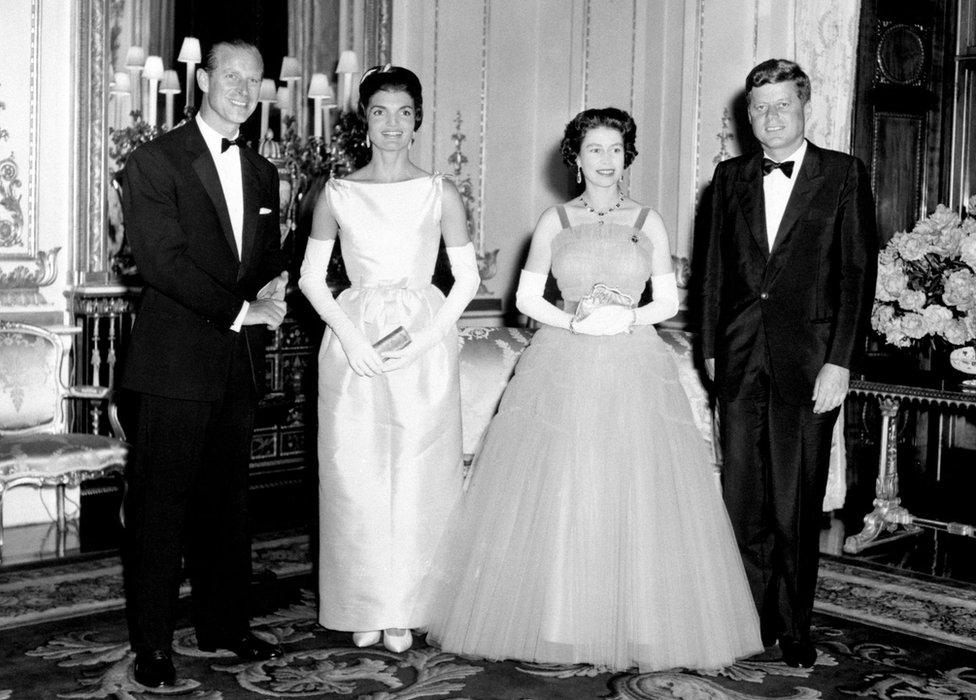
With President John F Kennedy and his wife Jackie at Buckingham Palace
The duke enabled the Queen to perform her role as head of state while he took on the role of head of the family. To the outside world she was the boss - in private the roles were reversed. Prince Philip was in charge of the barbecue while she did the washing up - as seen in the 1960s documentary about the Royal Family.
He would accompany her at big national moments - state visits, the state opening of Parliament, Remembrance events, anniversaries and thanksgiving services. Watch the footage - you will often a see a little glance between them, a small smile. Private moments in the most public of forums.
The duke would often be the one at engagements chatting animatedly to crowds or guests, paving the way or breaking the ice for the Queen's arrival. It was a double act which worked.
But the relationship also worked because they spent time apart. As the duke himself once said: "It's the secret of a happy marriage to have different interests."
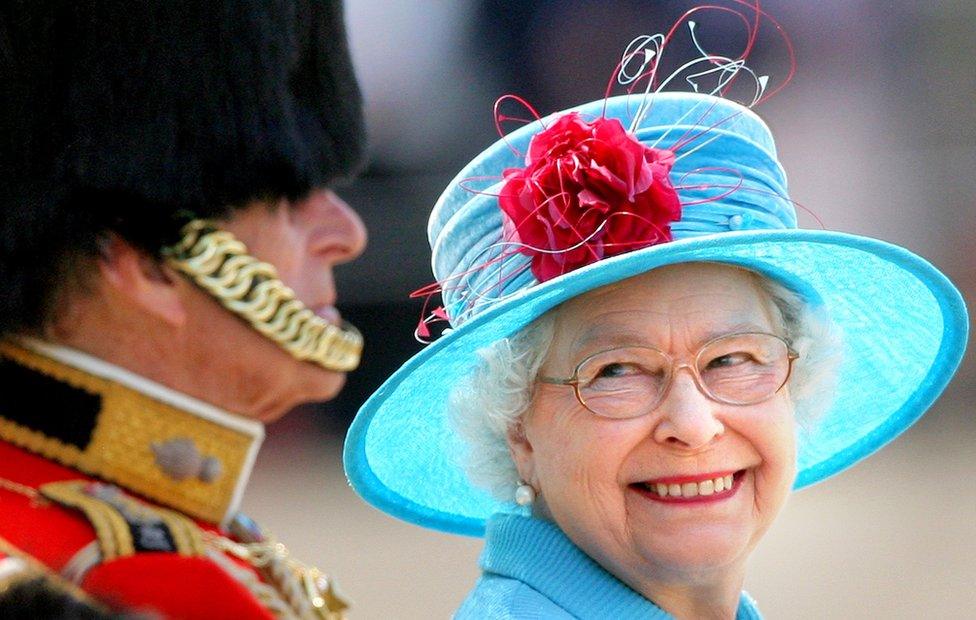
The annual Trooping the Colour parade in 2009
The Queen famously loves dogs and horses and spends a considerable amount of her free time keeping up with her race trainers and breeders. Prince Philip was a prolific sportsman throughout his life, took a keen interest in the running of the family estates and, in his later years, could often be seen carriage riding around Windsor Great Park or Sandringham.
In 2012, Prince Harry said: "Regardless of whether my grandfather seems to be doing his own thing, sort of wandering off like a fish down the river - the fact that he's there, personally, I don't think she could do it without him."
Finally deciding he had "done his bit" after years of service, Prince Philip retired from public life in 2017. It meant we became used to seeing the Queen either on her own, or supported by another member of the family when carrying out her official duties. Up until March 2020, the duke could most usually be found in Wood Farm on the Sandringham estate in Norfolk.
HMS Bubble
He was a man who famously did not like a fuss, and after years of having to get dressed up, make small talk and shake hands, there's little doubt he enjoyed the time simply reading, writing and painting. The downside being that the Queen's role necessitated she stay largely in London and Windsor. No doubt they were in touch regularly, but physically, they were separated.
However, when the Covid-19 pandemic hit, it was decided the two of them should shield together at Windsor Castle looked after by a small, dedicated staff which became known as HMS Bubble.
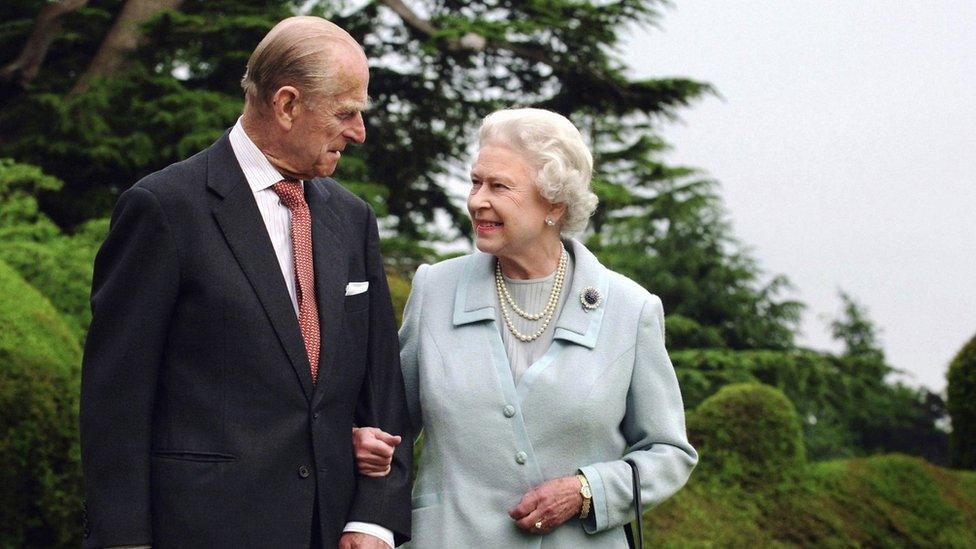
From March 2020, in the final months of their marriage, because of the pandemic they spent more time together than they otherwise might have done. Within the confines of the castle, they would have had endless hours to reflect on the extraordinary things they had seen and experienced together.
For more than 70 years they have been the one constant in each other's lives and the Queen will feel Prince Philip's loss deeply and profoundly.
Never showy or openly demonstrative - theirs will be remembered as an enduring royal love story.



- Published9 April 2021
